Who we are
CBM Australia is a Christian international development organisation committed to empowering people with disabilities in the poorest communities around the world. CBM Australia is a member of the CBM Global Disability Inclusion Federation.
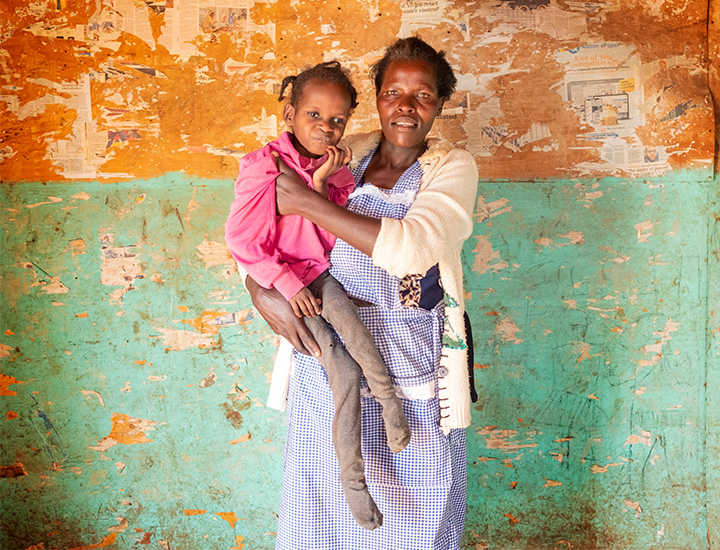
Our vision
We are driven by our vision for an inclusive world in which all people with disabilities enjoy their human rights and achieve their full potential.
Our mission
We are committed to our mission of fighting to end the cycle of poverty and disability.
We work for positive change, inspired by a vision of a just and equitable world.
Thanks to the generosity and commitment to justice of our supporters, partners, and allies, transformative change for people with disabilities living in poverty was active across 2024. More than 3.9 million people had their lives transformed through our international programs and many millions more through our advisory and advocacy work.
In 2024, we again influenced advisory partners who bring a combined program spend in excess of $1 billion.
How we work
We work alongside people with disabilities living in the world’s poorest places, to fight poverty and exclusion and transform lives.
We work in more than 20 countries, investing in long-term, authentic partnerships with the disability movement.
We multiply our impact by delivering inclusive community-based programs, strengthening health systems, advocating for national and global policy change, and providing inclusion advice and expertise to other organisations and governments.
Drawing on more than 115 years’ experience and driven by Christian values, we work with the world’s most marginalised in society to:
- End the cycle of poverty and disability;
- Treat and prevent conditions that lead to disability; and
- Build inclusive communities where everyone can enjoy their human rights and achieve their full potential.
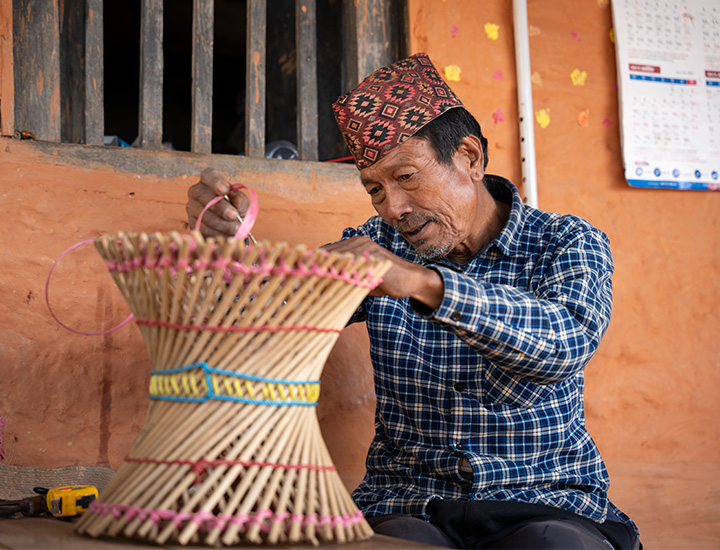
Why we exist
Over one billion globally have a disability – 80% living in low- and middle-income countries. In fact, 20% of the poorest people living in these countries have disabilities.
People with disabilities in these nations face enormous challenges including stigma, violence and profoundly diminished access to physical and mental health care, food, education and assistive devices. Together this means that people with disabilities commonly live in extreme poverty.
We’re for the one – and the one billion

1 b+

80%

20%
Andrew Ellis Board Chair 
It is together, across many different roles and contributions, that we have a widening path for transformative impact with and for people with disabilities in the poorest communities in our world.
The path has been able to widen despite greater marginalisation, inequality and brokenness at community and global levels. As a Board, we reflected in 2024 on the ever-present good news that God gives to us an unfathomable peace; sharing an unimaginable power to see wholeness made possible. And we, in turn, are able to share this possibility with, and alongside, others.
“I am leaving you with a gift – peace of mind and heart. And the peace I give isn’t fragile like the peace the world gives. So don’t be troubled or afraid.” – JOHN 14:27
Our own giving in the face of deep challenges is a marvellous catalyst. Many types of partners and supporters give to the movement that is CBM Australia’s mission. They give time, solidarity, resources, dollars, feedback, prayers, and action. They are thoughtful allies. And many of these CBM allies make possible deep, enduring, investment. 2024 bequest giving grew to over $5M, in a result matched only once in the last 10 years.
On behalf of the Board, I offer gratitude for the humility and commitment of all who are on the journey with CBM. Commitment exercised with humility creates the enabling culture and organisational performance that we have seen in 2024.
This Annual Report tells some of the story of these mindsets and the resulting impact in people’s lives; enjoy!
Jane Edge Chief Executive Officer 
CBM Australia is persistently driven by seeing our values active in all our behaviour, decision-making and action alongside people with disabilities and their communities. This includes thoughtful stewarding of our resources during these complex economic times.
This is an Annual Report of celebration. It is also an invitation to test CBM Australia’s accountability for working authentically and responsibly, with meaningful transparency.
We are striving to better tell our story – and to convey it powerfully, simply and consistently.
The over one billion people living with disability globally are more likely to also live in poverty. CBM Australia exists for each person, each one, living with a disability in poverty. We work together to build from the ‘one’ to the ‘one billion’, going the extra mile for those most excluded and most left behind.
We’re for the one – and the one billion
Every person experiencing disability and poverty has a name, a story, and a contribution to make.
Deeply engaged in our CBM Global Federation, we take grassroots learnings to a global view to enable positive impact at scale.
We celebrate the incredible strides we’ve made together for disability equity across our region. One big stride has been supporting the Australian Government’s journey to release, in November 2024, its International Disability Equity and Rights Strategy (IDEARS). IDEARS will impact everyone’s practice by setting targets for performance on disability inclusion across all international development efforts.
We are creating transformational change by clearly defining our role and value proposition as a development partner. There was significant evolution in our value add during 2024. There will be more in 2025, and much more is still needed. Please continue to join with us in seeking to empower and enable local solutions for resilient, thriving and inclusive communities.
Our work internationally
CBM Australia consistently hears from stakeholders that we are an important ally to the disability movement, and this cuts across all the work we do. In 2024, we worked with a range of OPDs throughout Asia, Africa and the Pacific, helping to make their organisations stronger through tailored support in areas like financial management, organisational policies and governance. Foundational work like this makes OPDs more robust and better able to represent the interests of people with disabilities to governments.
The release of the Australian Government’s International Disability Equity and Rights Strategy (IDEARS) in 2024 further reinforced the value of our work.
Across our international programs, we continued to support disability movements and address the
preconditions for inclusion, creating an enabling environment for people with disabilities enabling their full participation in community life. We have continued to expand our work in the Pacific, with new programs funded in Papua New Guinea focused on eye and ear health, and in Fiji focused on children with disabilities’ access to support services.
The intersection of poverty and a changing climate significantly impacts mental health. To address this, we have supported mental health programs in Indonesia, Nepal and Kenya. In 2024, with funding from the Australian Government’s Partnerships for a Healthy Region initiative, we launched the “Rise and Thrive” program in Fiji and the Philippines to enhance mental health services and empower individuals with psychosocial disabilities.
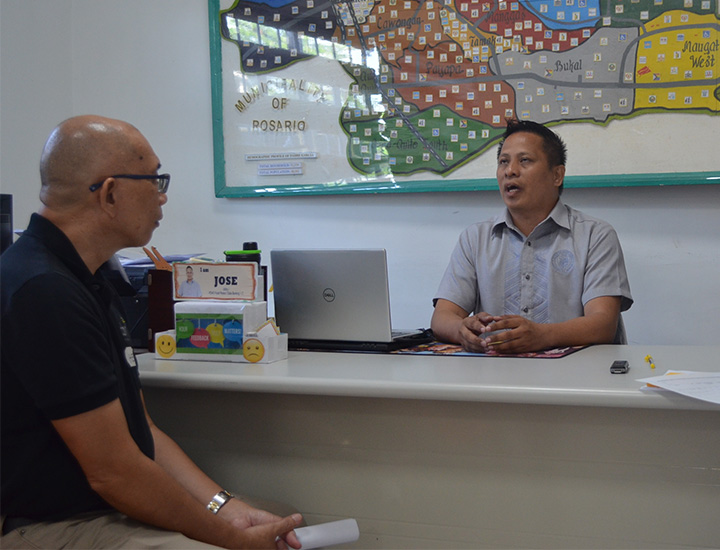
Reflecting on the long-term impacts of our projects, we returned to the Batangas region of the Philippines to review a project that concluded in 2013. We found that the Parent’s Association set up by CBM’s partner organisation remains active, with over 1,000 members in regional support groups. These parents of children with disabilities have developed strong links with local government, facilitating access to rehabilitation, education and assistive devices.
As our CBM Philippines coordinator noted, “A child with a disability living in Batangas will be so much better off because of what CBM got rolling 10 years ago.”

11

75

53
Our impact
Our programs reinforce our commitment to transforming people’s lives, by removing barriers in policies and systems that exclude people with disabilities, and by advising organisations on how to better address disability issues in their programs.
The Include Us project, which ran for five years in Nepal, is a successful example of a combined approach. As well as working with both national and provincial governments to ensure that public services were more accessible, it also advised government bodies on how to include disability considerations in surveys like the national census. And it focussed on supporting individuals to improve their lives.
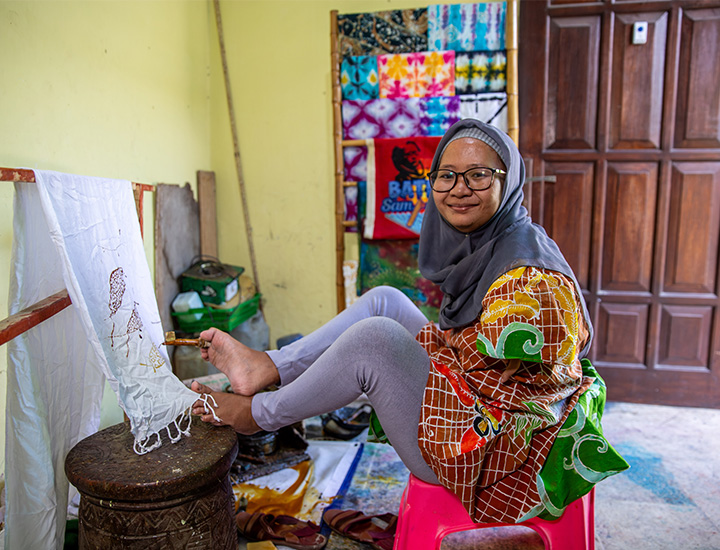
Our CBM team visited Nepal in 2024 to understand the impacts of one of the 13 projects supported by CBM in Nepal, and we were elated by the incredible feedback. We invited 60 people with disabilities to a meeting to share their reflections on the five-year Include Us advocacy project and its achievements.
We were surprised when one participant, Shanti, confidently took the microphone and addressed the crowd.
“For a person with learning difficulties like me, what’s happened has changed my life. I feel more confident – to freely express my preferences – about what I eat and what I wear. My decision-making has increased.”
Her words sparked a wave of responses from others in the room.
“Before I didn’t have any friends, but now I have more friends,” shared one participant.
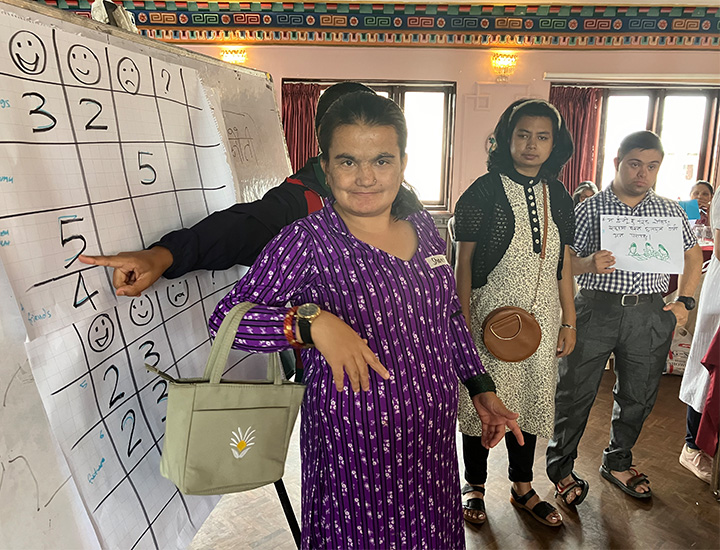
“This has changed my life.” – Shanti
One component of the Include Us project has focused on supporting a group of around 20 people with intellectual disabilities to improve their social connections, enhance communication skills, and foster a better understanding of their rights.
The impact has been transformational.
Boredom and loneliness were a common theme for the participants. Now, they are more connected with others and have friendships with people who share similar experiences. And there’s been a clear shift in roles. Where once their parents were the primary advocates for access to training, benefits, and health support, these young people are now learning to advocate for themselves.
The project also introduced opportunities in vocational work, such as hospitality, resulting in several participants securing part-time jobs. Parents observed the positive impact on the whole family – when they see that their adult child can now, for example, confidently take public transport and feel less shy interacting with others.
“It’s great to see my son involved in new things,” shared one mother.
“And I’m also able to talk to other parents. Sometimes I have been pretty depressed – now I can share my feelings.”
Another parent reflected on the transformation:
“I now have the courage to accept my child’s disability. What the project has done is to push the parents particularly to see the potential of their children, because often they are the ones holding them back – because of fears for their safety, or fears of bullying.”
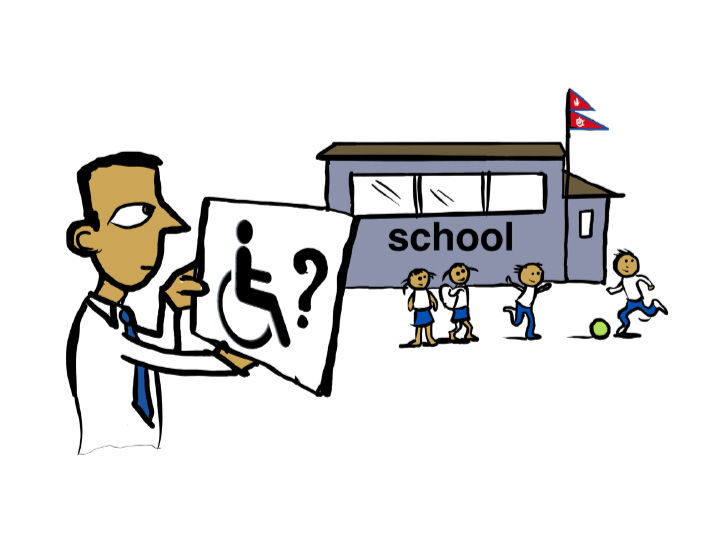
The Include Us project is implemented by CBM partner the National Federation of the Disabled Nepal (NFDN), an organisation committed to ensuring people with disabilities can access important information. All their materials are produced in Braille, audio, and Easy Read formats to accommodate people with learning difficulties. To ensure the accuracy of their materials, the NFDN also employs a group of people with intellectual disabilities to check and edit the drafts of all Easy Read publications before they go to print.
Parents participating in the project discerned the potential to introduce more Easy Read publications on other issues their children face, such as sexual and reproductive health, managing relationships, and managing money.
Opening the gates – reclaiming freedom and dignity of people with psychosocial disabilities
In Indonesia, as in many countries where CBM works, people with mental health conditions, disabilities, homelessness, or minor criminal histories can end up in institutions called social rehabilitation centres. Once there, it’s difficult for them to leave.
For the past three years, CBM Australia, in partnership with the Indonesian Mental Health Association (IMHA) and PRY, a disability-focused rehabilitation organisation, has been working to help people in these types of institutions and improve policies and systems. The project aims to build community-based services and support systems. Focused on three institutions in Java, this initiative seeks to encourage more humane treatment and challenge the pervasive belief that people with mental health or psychosocial disabilities need to be locked away.
People with lived experience of psychosocial disability are advising the government on how to improve policies and programs. They are raising awareness about the terrible conditions in these institutions, where it is not unusual to find people chained to
concrete blocks, sitting in their own waste. There are few social activities, and people have no control over their daily lives. In some cases, women are forcibly given contraception, and everyone is given the same medication, regardless of their individual needs. There are no clear pathways for rehabilitation or reintegration into the community.
Hari, from CBM Indonesia, explains,
“We got government officials to visit institutions, and this had a profound impact. It gave them a firsthand look at the harsh realities that people with psychosocial disabilities face. This created a sense of urgency and shifted perspectives, leading to more empathy among decision-makers.”
The Indonesian Government has begun taking steps towards deinstitutionalisation, recognising the need to build community services as an alternative to institutional care. While institutions still exist, there is now a push to better monitor abuse and violence and improve living conditions.
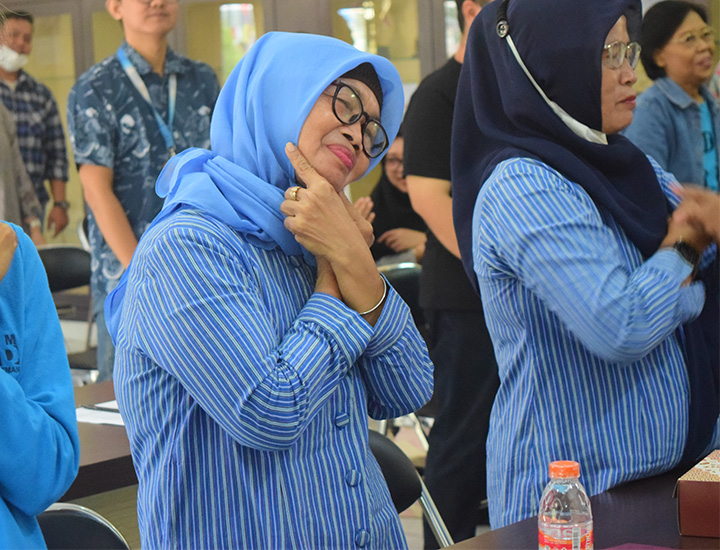
CBM partners have trained staff at institutions on disability rights. One institution in Yogyakarta has started an activity program linked to local community projects.
“Before, people were never allowed out of the institution, and locals were scared of them,” Hari said. “Now, with the project team’s help, people are allowed to get involved in activities like chicken farming, barista training, and cooking. They even receive small start-up kits to help them get started. This project is beneficial for both the individuals and the community, changing local perceptions and offering hope to people with psychosocial disabilities. Many of those in institutions come from poor families, so teaching them skills to earn money is an important step towards improving their lives.”
Though there’s still a long way to go, CBM Australia is proud to be working alongside other groups to bring about meaningful, long-term change for some of society’s most vulnerable, neglected, and abused individuals.
CBM Australia acknowledges the support of the Australian Government through the Australian NGO Cooperation Program (ANCP).
Because of you
Poverty and disability go hand-in-hand creating a cycle of inequality, isolation and exclusion. Our amazing movement of incredible CBM Australia supporters enables transformational change for people with disabilities and their communities in the world’s poorest places.
Despite economic challenges both in Australia and abroad, you continued to give to our work to prevent and treat avoidable blindness and fistula in women, to support mental health and livelihood programs and to provide humanitarian aid.
Due to years of ongoing support you helped the world achieve a significant milestone this year, with River Blindness being on the brink of total eradication in areas where CBM operates. This is all thanks to you!
Your support didn’t stop there. Your faithful prayers and our team of dedicated volunteers ensured we met the inordinate amount of work and dedication needed to reach our strategic goals and activate stronger connections.
Due to your increasing advocacy support, we welcomed the release of the Australian Government’s new International Disability Equity and Rights Strategy (IDEARS), and celebrated the announcement of an additional $12 million for assistive technology in the Indo-Pacific over four years. This is exactly what we had been asking for.
This ground-breaking strategy paves the way for equity, prioritises partnerships with Organisations of People with Disabilities, and sets performance targets for disability equity across all international and humanitarian efforts. With 2.5 billion people, or 1 in 3 of us, requiring some form of assistive technology, it marks a momentous step forward towards disability equity in the Australian aid program.
Significantly, you also funded our internationally recognised advisory work. As experts in disability inclusion, we have shared our knowledge with some of the world’s largest institutions and other humanitarian partners, providing support and expertise to organisations
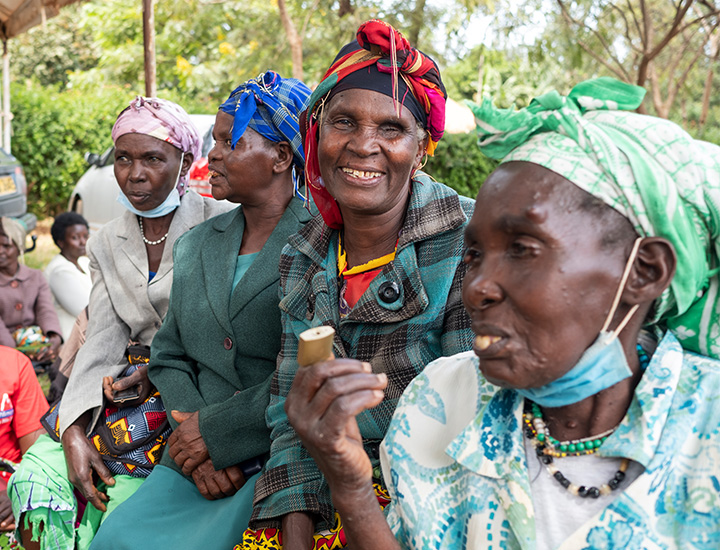
like CARE, Plan and the World Food Programme, ensuring they include people with disabilities in the formation of their programs on the ground. Multiplying our influence across numerous organisations to ensure more people with disabilities are not left behind.
We love the opportunity to meet our CBM Australia family and keep you informed of our priorities – having the opportunity to provide feedback and ask questions is a cornerstone of our values. Our Melbourne, Brisbane and Sydney events in 2024 did just that. You heard of the significant impact of your contribution, enjoyed individual stories of transformation that touched your hearts and asked our team questions that were important to you.
Whether you have given to specific areas of our work, countries of interest or individual programs, we thank you.
To read more about how your support helps people with disabilities and their communities, and how CBM works together with local partners on the ground to respond to the needs of people in the poorest places, visit our stories.
Improving disability laws in Nauru
Our CBM Australia Inclusion Advisory Group (IAG) is often called on to help governments ensure that their laws and policies are in line with the Convention on the Rights of Persons with Disabilities. In 2024, we were contracted to help the Nauru Government review their Mental Health Act.
CBMA’s Isabel Calvert explains:
“The Act was drafted in 1963, and while amended on and off over the years, it was not in keeping with current practice. We had a unique opportunity to support the Nauru Government to better protect the rights of people with mental health conditions, by reviewing this outdated law.”
Our recommendations balance international best practice with the practical realities of Nauru. Once the recommendations are adopted, it will mean that people with mental health conditions, who pose no serious threat in their community, will not be subject to involuntary medical treatment – which is unfortunately often the case. Nor will they be locked up in Nauru’s prison. This will strengthen the health system and improve community-based services.
The recommendations also include changes to ensure that property and assets owned by people with mental health conditions cannot be controlled by others, without their consent.
CBM talked to the government department that supports people with disabilities, the police, people in the justice system, health professionals and social workers, even the statistics office. We consulted with the national Disability Council, where the local OPD plays a key role.
This work is a strong example of how CBM advice can address the systems and policies that can help achieve disability equity. As the IAG becomes more involved in advising on disability-focussed law reform, our approach in Nauru sets a precedent for conducting rights-based legal reform.
Eighteen other laws passed since 2015 that also impacted people with mental health conditions were also reviewed. We helped identify ways to strengthen disability equity and rights for all people with disabilities, with and without mental health conditions, including through amendment of the general disability law.
As the Nauru Government takes this work forward, it will be the first government in the Pacific region, and the first Small Island State in the world, to take a rights-based approach to mental health law reform, consistent with guidance from the World Health Organisation and the Office of the High Commissioner for Human Rights.
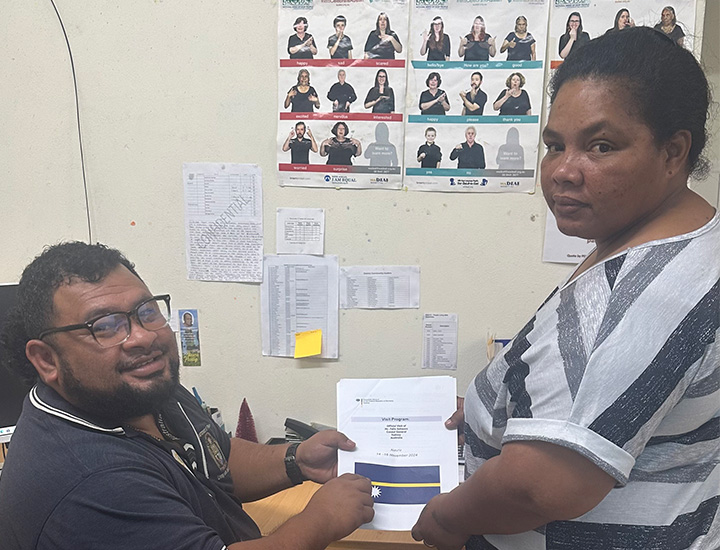
Vibrant volunteers
Jocelyn “Joc” first started volunteering with CBM in the 1980s soon after the Australian office opened in Kew.
Joc was a driver for CBM pastoral care workers who were vision impaired. The pastoral care workers would visit other sight-impaired people who were housebound in their homes or living in aged care facilities.
Along with the driving, Joc also volunteered throughout the ‘80s and ‘90s in the CBM Australia office fulfilling a variety of administration tasks.
Joc was inspired to volunteer with CBM because she personally resonated with the mission of CBM in working towards every person having the opportunity to achieve their full potential.
Joc shares that when she was at school, there were very limited opportunities for girls.
Many girls left school at the age of 14 or 15 or became teachers and nurses. Joc was very fortunate to have a remarkable science teacher at high school who encouraged girls to pursue excellence! It was with this strong support and encouragement that Joc moved into studying, and consequently working, in pathology for many years.

Over the past five years, Joc has taken on the role of writing birthday cards on behalf of CBM Australia and is also a member of the CBM Volunteer Prayer Team.
Joc shares,
“I am so thankful for the opportunity to volunteer with CBM. It is a gift indeed to know that I am contributing to the ongoing lifechanging work of CBM.”
We asked Joc what her message would be to people who are interested in volunteering. With heartfelt emotion she said,
“I know it can be rather cliché that the more you give, the more you get back, but I have found that really is true! It’s all about the people, all about the relationships. That is so important”.
Legacy gifts
CBM Australia remembers and expresses deep appreciation to the families of those who have left CBM Australia a gift in their will. We also acknowledge and sincerely thank the many other legacy donors who chose to remain anonymous. Gifts in will received in 2024 were a significant contributor to lives changed as we together advance our vision and mission in the poorest places globally.
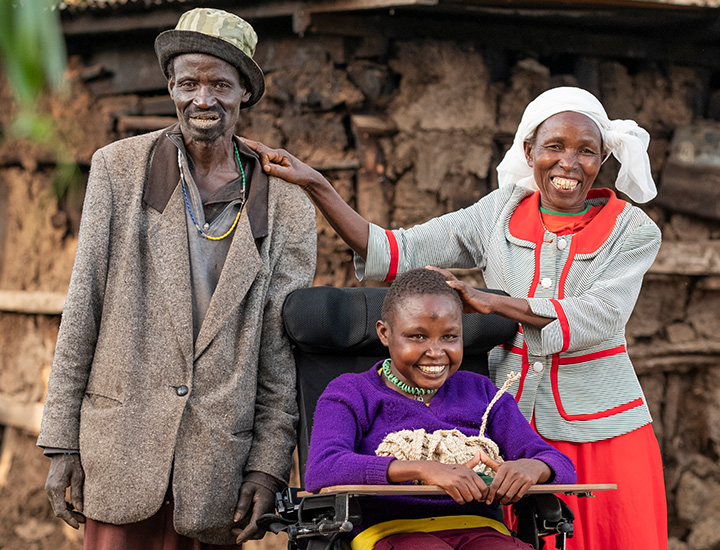
Our office of Gift Planning can provide you with resources to help fulfill your philanthropic wishes in coordination with your overall financial and estate planning.
For more information, please email our philanthropy coordinator.
Strengthening CBM Australia’s team and foundations
In 2024, CBM Australia continued our mission to uplift our people by enhancing systems, fostering employee connections, driving engagement, and strengthening stewardship.
In October, we proudly celebrated the completion of our new accessible premises – a significant milestone in fostering connection and creating a sense of community. With most employees working in the office two days a week under our hybrid working model, we aim to leverage this space to facilitate greater collaboration throughout 2025.
Our team’s dedication to creating opportunities for connection across all business areas has been evident throughout the year.
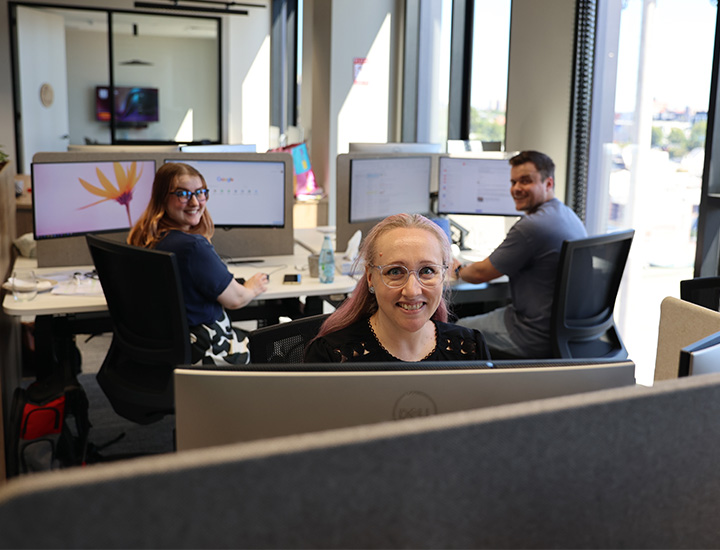
In collaboration with staff and management, we finalised a comprehensive suite of People Standards. These new standards represent the first and most significant strand of our People Engagement Framework. They bring substantial clarity to how we approach employment conditions, ensuring consistency, modernity and accessibility in all aspects of our workplace practices, contributing to a more transparent and supportive work environment.
Measuring and enhancing employee engagement has been a key focus in 2024. We introduced a new approach to measure engagement and worked collaboratively on areas needing improvement, reflecting our dedication to continuous growth and support.
Our Disability Action Plan
Background
CBM Australia’s Disability Action Plan (DAP) 2023–2025 was developed as a framework to support us to build a disability inclusive culture. The four aspirational aims of the DAP surround:
- Our organisational commitment
to inclusion - Our people
- Our work spaces and practices
- Our suppliers and partners
Progress in 2024
In alignment with our values, employees and management advanced several key DAP initiatives. These efforts include improving recruitment practices, developing employee training, and further embedding our Disability Employee Network (DEN) and our support group, the Disability Inclusion Group (DIG).
In response to current market challenges and to attract top talent, we strengthened our talent attraction strategy. This ensures the CBM value proposition and mission are clearly communicated, making our pathways to talent acquisition more effective and transparent.
The strength of our partnerships, combined with the generosity and compassion of our supporters, continues to inspire our team.
We remain firmly focused on our vision of ending the cycle of poverty and disability, driven by the commitment and dedication of our people.
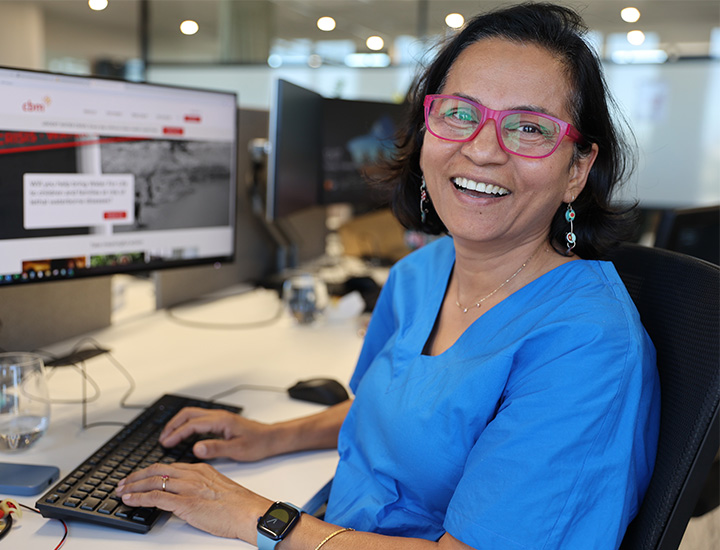
Our values
We champion inclusion.
We pursue excellence.
We strive for justice.
We embrace partnerships.
We live with integrity.
At CBM Australia we live out our values.
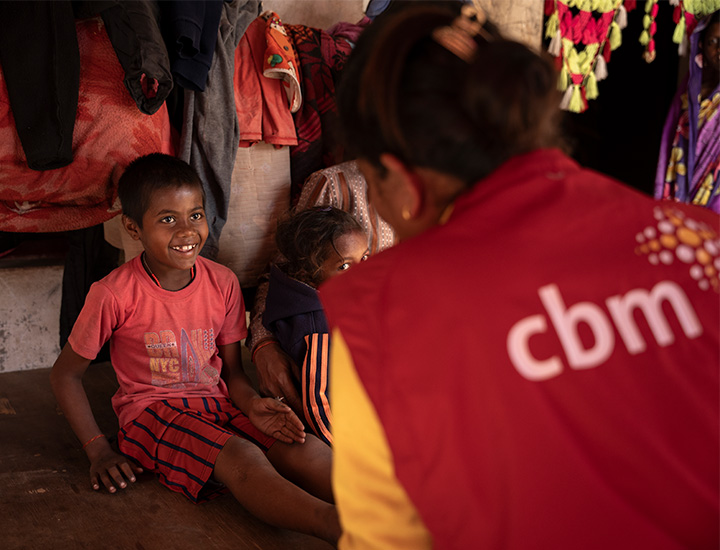
Our governance
Our volunteer Board members act in a non-executive capacity to provide strategic direction and prudent oversight to CBM Australia.
The CBM Australia Board, which includes Directors with lived experience of disability, balances in-person Melbourne meetings with online meetings. We seek to enable a variety of interactions that are family-friendly and promote engagement across all our work. The first ever Sydney-based Board meeting was held in November 2024 and included hearing from and sharing lunch with a number of supporters.
The Board remains well supported by four Board Committees. The Board and its Committees together set and adaptively manage our Strategic Directions 2026. The Board is assisted by external Board review, last conducted in the second half of 2024.
Our Board Development & HR Committee (BDHR) leads Board recruitment and skills mapping, reviews regulatory requirements, promotes good governance practice and oversees CBM Australia culture and ways of working.
In 2024, Claire Velasco and David Toma resigned from the Board, while Nathan Clarke and Wayne Tattersall were welcomed. Nathan served as a Board guest for a short period following a comprehensive recruitment process, while Wayne is a returning Board member. They bring deep financial, issues and risk management expertise alongside governance acumen.
Our Finance & Audit Committee (FAC) superintends healthy financial and risk management, including cyber security. The emphasis upon risk is underlined by a change of name, from 2025, to the Finance, Risk & Audit Committee. 2024 saw the development of a Balance Sheet Strategy which set parameters for how CBMA best leverages its Balance Sheet health for maximum positive impact. CBMA’s new office home in Richmond, being cheaper and more sustainable, is a direct example of powerful leverage.
Our Programs Committee sustained oversight of program strategy and impact for CBMA, with particular attention to our advisory offerings and our work in the Pacific. Conversation is focussed around how CBMA supports greater empowering of local disability leaders within all our partnerships. The Committee monitors a deepening relationship with the Department of Foreign Affairs and Trade, across the three strands of the Australian Government’s ANCP program (field work), its Disability Section (advisory work) and its Global Health Section (a regional health partnership).
Our Community Engagement & Fundraising Committee (CEF) monitors data and learnings to consider the CBM brand reach and resonance, and how more Australians might come to engage with the cause of ending poverty and exclusion globally. CEF oversees CBMA’s compliance with the Australian Council for International Development (ACFID) Fundraising Charter.
CBM Australia is a full and strongly contributing member of the CBM Global Federation, alongside CBM Ireland, CBM Kenya, CBM New Zealand, CBM Switzerland, and CBM UK.
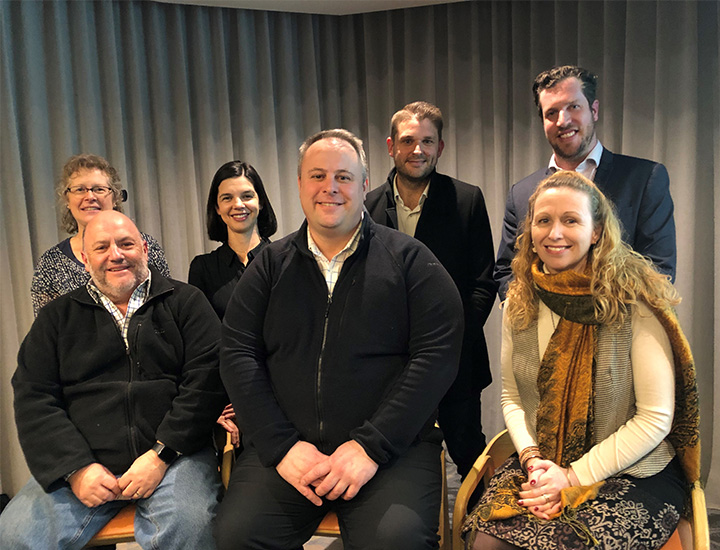
Our finances
The generosity of CBM Australia supporters throughout the continued global uncertainties of 2024 was incredible, with 2024 giving at $22.63M.
Part of that enabling generosity was a number of substantial bequests received late in the year, bringing 2024’s bequest income to a 7 year high of $5.4M. CBM Australia also experienced nearly $2M in positive movement in the underlying value of CBMA’s investment portfolio. This does not mean actual income, while it does mean additional value that our accounts must recognise.
Between the bequest result and the unrealised market gain, our 2024 financial position has resulted in a comprehensive surplus.
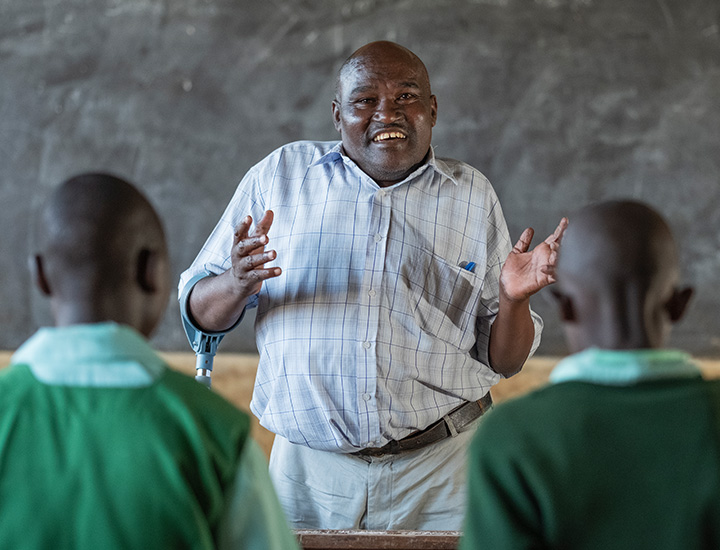
Future planned deficits are intended to increase funding to program activities to leverage the full benefit of these gains.
In 2024, for every dollar given to CBM Australia, 77 cents supported field programs and 18 cents generated funds to support future programs, leaving 5 cents to deliver accountability and administration.
CBM Australia’s Inclusion Advisory Group (IAG) continued to grow in 2024 with a total income of $4.22M.
The Australian Government has continued its partnership with CBMA through our IAG services, the Australian NGO Cooperation Program (ANCP) and the Regional Health Partnership (RHP) to implement development and poverty-alleviation programs overseas.
Directors’ Declaration
The directors of CBM Australia Ltd declare that the accompanying concise financial report is presented fairly in accordance with applicable Australian Accounting Standards and is consistent with the CBM Australia 31 December 2024 financial statements.
In respect to the 31 December 2024 financial statements of CBM Australia, the directors declare that the financial statements and associated notes comply with Accounting Standards and the requirements of the Australian Council for International Development Code of Conduct (ACFID).
The financial statements and notes give a true and fair view of the financial position as at 31 December 2024 and the performance of CBM Australia for the year then ended.
In the directors’ opinion, there are reasonable grounds to believe that CBM Australia will be able to pay its debts as and when they become due and payable. This statement has been made in accordance with a resolution of the Directors made on 22 March 2025.


